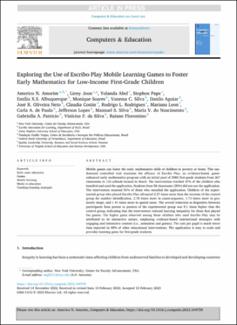| dc.contributor.author | Americo N. Amorim, Lieny Jeon, Yolanda Abel, Stephen Pape, Emilia X.S. Albuquerque, Monique Soares, Vanessa C. Silva, Danilo Aguiar, Jose R. Oliveira Neto, Claudia Costin, Rodrigo L. Rodrigues, Mariana León, Carla A. de Paula, Jefferson Lopes, Maxsuel S. Silva, Maria V. do Nascimento. Gabriella A. Patricio, Vinícius F. da Silva, Raiane Florentino | |
| dc.date.accessioned | 2023-04-03T18:43:27Z | |
| dc.date.available | 2023-04-03T18:43:27Z | |
| dc.date.issued | 2023-03-16 | |
| dc.identifier.citation | Americo N. Amorim, Lieny Jeon, Yolanda Abel, Stephen Pape, Emilia X.S. Albuquerque, Monique Soares, Vanessa C. Silva, Danilo Aguiar, José R. Oliveira Neto, Claudia Costin, Rodrigo L. Rodrigues, Mariana Leon, Carla A. de Paula, Jefferson Lopes, Maxsuel S. Silva, Maria V. do Nascimento, Gabriella A. Patricio, Vinícius F. da Silva, Raiane Florentino, Exploring the Use of Escribo Play Mobile Learning Games to Foster Early Mathematics for Low-Income First-Grade Children, Computers & Education, 2023, 104759, ISSN 0360-1315, https://doi.org/10.1016/j.compedu.2023.104759. (https://www.sciencedirect.com/science/article/pii/S0360131523000362) Abstract: Mobile games can foster the early mathematics skills of children in poverty at home. This randomized controlled trial examines the efficacy of Escribo Play, an evidence-based, game-enhanced early mathematics program with an initial pool of 2980 first-grade students from 267 classrooms in 132 schools located in Brazil. The intervention reached 47% of the children who installed and used the application. Students from 56 classrooms (20%) did not use the application. The intervention retained 51% of those who installed the application. Children of the experimental group who played Escribo Play advanced 2.27 times more than the increase of the control group for number identification, 2.78 times more in count-sequence, 1.73 times more in geometric shape, and 1.41 times more in spatial sense. The overall reduction in disparities between participants from pretest to posttest of the experimental group was 9.1 times higher than the control group, indicating that the intervention reduced learning inequality for those that played the games. The higher gains observed among those children who used Escribo Play may be attributed to its interactive nature, employing evidence-based instructional strategies with engaging and interactive content (i.e., animation and games). The cost per pupil is much lower than reported in 90% of other educational interventions. The application is easy to scale and provides learning gains for first-grade students. Keywords: Early years education; Games; Mobile learning; Media in education; Teaching/learning strategies | en_US |
| dc.identifier.issn | 0360-1315 | |
| dc.identifier.uri | https://repositorio.ciedupanama.org/handle/123456789/278 | |
| dc.description | Mobile games can foster the early mathematics skills of children in poverty at home. This randomized controlled trial examines the efficacy of Escribo Play, an evidence-based, game-enhanced early mathematics program with an initial pool of 2980 first-grade students from 267 classrooms in 132 schools located in Brazil. The intervention reached 47% of the children who installed and used the application. Students from 56 classrooms (20%) did not use the application. The intervention retained 51% of those who installed the application. Children of the experimental group who played Escribo Play advanced 2.27 times more than the increase of the control group for number identification, 2.78 times more in count-sequence, 1.73 times more in geometric shape, and 1.41 times more in spatial sense. The overall reduction in disparities between participants from pretest to posttest of the experimental group was 9.1 times higher than the control group, indicating that the intervention reduced learning inequality for those that played the games. The higher gains observed among those children who used Escribo Play may be attributed to its interactive nature, employing evidence-based instructional strategies with engaging and interactive content (i.e., animation and games). The cost per pupil is much lower than reported in 90% of other educational interventions. The application is easy to scale and provides learning gains for first-grade students. | en |
| dc.description.abstract | Mobile games can foster the early mathematics skills of children in poverty at home. This randomized controlled trial examines the efficacy of Escribo Play, an evidence-based, game-enhanced early mathematics program with an initial pool of 2980 first-grade students from 267 classrooms in 132 schools located in Brazil. The intervention reached 47% of the children who installed and used the application. Students from 56 classrooms (20%) did not use the application. The intervention retained 51% of those who installed the application. Children of the experimental group who played Escribo Play advanced 2.27 times more than the increase of the control group for number identification, 2.78 times more in count-sequence, 1.73 times more in geometric shape, and 1.41 times more in spatial sense. The overall reduction in disparities between participants from pretest to posttest of the experimental group was 9.1 times higher than the control group, indicating that the intervention reduced learning inequality for those that played the games. The higher gains observed among those children who used Escribo Play may be attributed to its interactive nature, employing evidence-based instructional strategies with engaging and interactive content (i.e., animation and games). The cost per pupil is much lower than reported in 90% of other educational interventions. The application is easy to scale and provides learning gains for first-grade students. | en |
| dc.format | application/pdf | en |
| dc.language.iso | en | en |
| dc.language.iso | en_US | en_US |
| dc.publisher | Science Direct - Computers & Education Journal | en_US |
| dc.rights | info:eu-repo/semantics/openAccess | en |
| dc.rights | https://creativecommons.org/licenses/by-nc-nd/4.0 | en |
| dc.subject | Early years education; Games; Mobile learning; Media in education; Teaching/learning strategies | en_US |
| dc.subject | Early years education; Games; Mobile learning; Media in education; Teaching/learning strategies | en |
| dc.title | Exploring The Use Of Escribo Play Mobile Learning Games To Foster Early Mathematics For Low-income First-grade Children | en |
| dc.type | info:eu-repo/semantics/article | en_US |
| dc.type | info:eu-repo/semantics/publishedVersion | en_US |
| dc.type | info:eu-repo/semantics/article | en |
| dc.type | info:eu-repo/semantics/publishedVersion | en |

